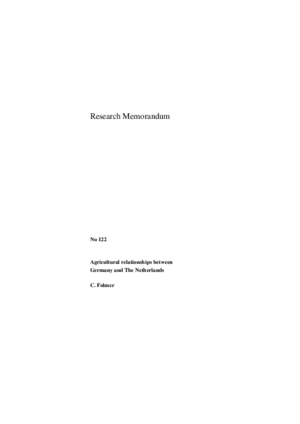January 1, 1995
Agricultural relationships between Germany and the Netherlands
Linkages between both countries are analyzed through their impact on bilateral trade. It appears that the Dutch bilateral trade surplus has increased from 1986 to 1992.
Government policy, historical developments and the speed of adoption of new technologies have had an important impact on the composition of trade. Mutations in trade flows are to a large extent induced by policy measures, changing consumer tastes and increasing competition from (notably) Eastern European countries.
Finally, the German unification has had and will continue to have its impact on trade flows. In the near future the speed and results of the transition process in East Germany, the impact of the GATT agreement and the reactions of agricultural suppliers to changes in consumer preferences in a satiated market, seem to set the scene.
Downloads
English, Pdf, 321.2 KB
Authors
Kees Folmer
